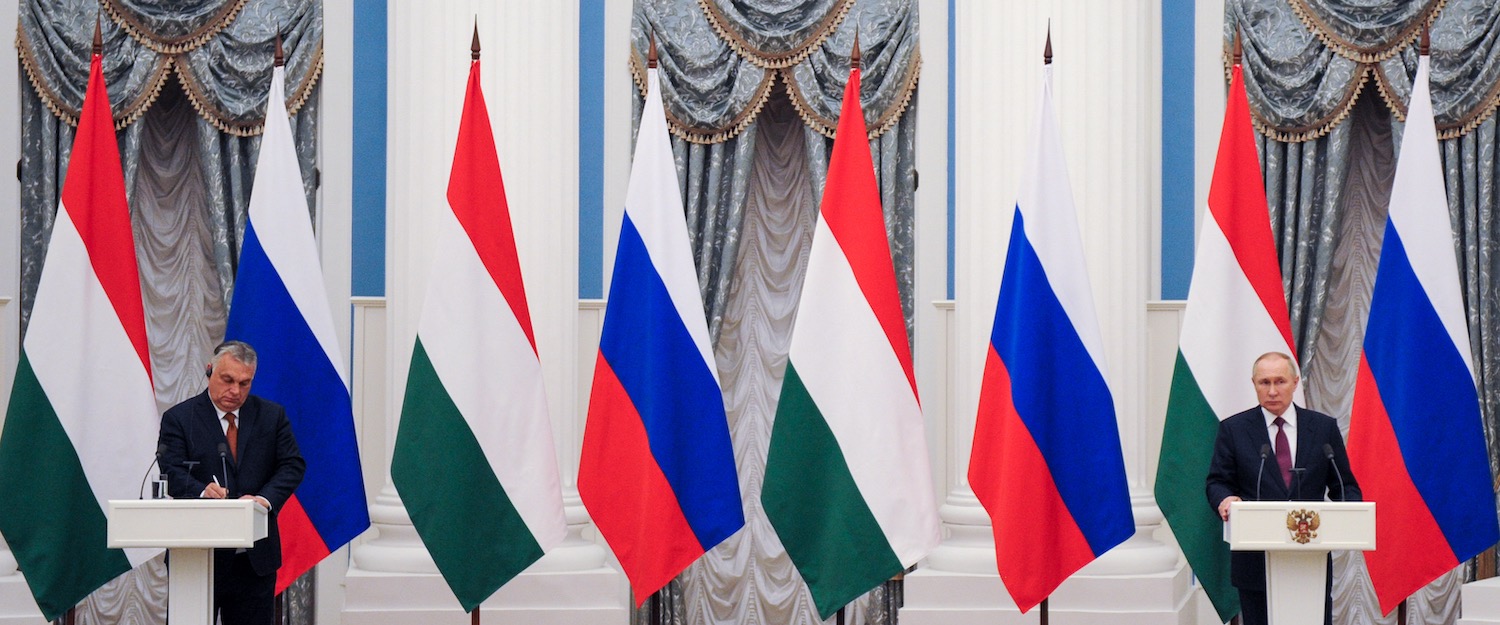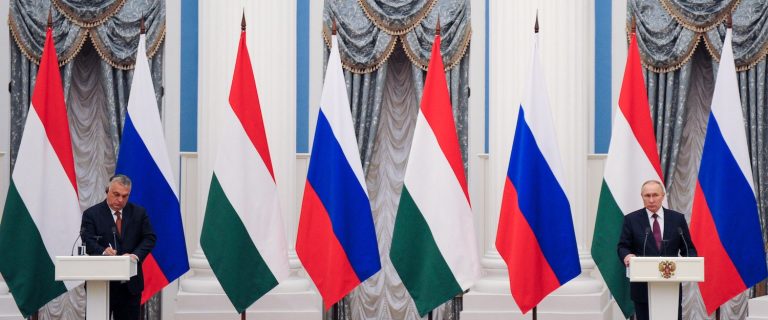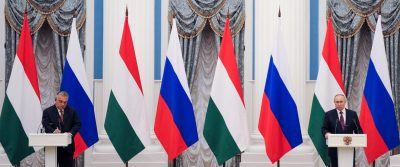Breaking NATO informal diplomatic protocol, Hungary’s senior army chief engaged in a conversation with Russia’s military attaché at a Chinese diplomatic event, surprising Western allies. While Bratislava, Prague, and Warsaw have all expelled Russia’s GRU-linked military attachés for espionage, Budapest continues to host them. The number of Russian diplomats in Hungary is nearly equal to the total in the other Visegrád countries combined.
This story is based on VSquare’s Goulash newsletter – read the full issue here with fresh scoops and a round-up of our latest investigations from Central Europe.
On the evening of September 26, 2024, at the Vígadó Concert Hall on the Pest side of the Danube riverbank, Lieutenant General Ferenc Kajári, deputy chief of the Hungarian General Staff, engaged in a lengthy conversation with Colonel Oleg Smirnov, the military and air attaché of the Russian Federation, during a reception hosted by the People’s Republic of China. In the gilded, chandelier-lit hall of the Vigadó, hundreds of guests, including numerous Hungarian government officials, businessmen, and foreign diplomats, were gathered to celebrate the 75th anniversary of the establishment of the People’s Republic of China and the commencement of diplomatic relations between China and Hungary.
It was in this crowd that the second-in-command of the Hungarian Armed Forces conversed with the Russian military attaché with remarkable ease – much to the astonishment of several attendees, as well as diplomats who heard about the scene from those present, sources familiar with the incident told VSquare. Since Russia attacked Ukraine in 2022, representatives of the Russian army have been regarded as unacceptable within the Western alliance, and protocol and diplomatic contact with them has nearly ceased.
“It caused confusion among NATO allies, as such communication is considered mauvais ton (bad, unacceptable behavior) in their countries,” said one source familiar with the incident. When we described the scene above to an official working at the NATO headquarters in Brussels, they responded, “In general, we find such behavior odd and unwelcome. Plus, with the Russian military attaché of all people? That person is 100 percent GRU!” The NATO official was referring to the fact that Russian military attachés have, as a rule, also been working for the GRU, the Russian military intelligence service, since the Soviet era.
It is unclear what topics Lieutenant General Kajári and Colonel Smirnov discussed, or whether they spoke about anything other than farewells and polite well-wishes (as Smirnov had just concluded his mission in Hungary). However, this reception may have been the first opportunity for the leadership of the Hungarian Armed Forces to personally convey their thoughts regarding comments made by Prime Minister Viktor Orbán’s political director Balázs Orbán (no relation) to the Russian military. The remarks made headlines in the international press a few hours earlier that day.
What were those comments? “Every country has the right to decide its own destiny for itself,” Balázs Orbán said on a podcast, adding, “But based on 1956, we wouldn’t have done what President Zelenskyy did two and a half years ago, because that was irresponsible.” His suggestion that Hungary – unlike Ukraine – wouldn’t defend itself against a Russian invasion caused a significant political scandal, and Balázs Orbán was forced to apologize the next day after Prime Minister Orbán publicly stated that his subordinate had made a mistake.
However, it remains unclear whether anyone from the Hungarian government communicated directly with the Russians to inform them that they are not actually welcome to invade – or whether the deputy chief of the Hungarian General Staff took the opportunity to do so at the Chinese reception. It would be quite newsworthy if he did – but even more so if he didn’t.
We sent detailed questions to Hungary’s Ministry of Defense regarding the protocol-breaking conversation but have received no reply.
Expelled from elsewhere – not from Budapest
But what are Russian military attachés doing in Budapest in the first place? After Russia’s full-scale invasion, EU and NATO allies expelled hundreds of Russian diplomats for espionage, and GRU-linked Russian military attachés and their deputies were among the first to become personae non grata.
When VSquare checked the lists of accredited diplomats in Visegrád countries, we found that Hungary is the only country in the region that still hosts a Russian military attaché. The total number of Russian diplomats in Hungary (45 in Budapest, Szeged and Debrecen) is almost as high as those in the Czech Republic (12), Poland (12 in Warsaw and 11 in other cities), and Slovakia (14) combined.
Moreover, the Hungarian foreign ministry’s diplomatic database – before this article’s publication it was last refreshed on October 14 – lists five Russian military diplomats in Budapest: one military and defense attaché, two military and air attachés, and two of their deputies. This suggests that both those who officially finished their posting – like the above mentioned Colonel Smirnov – and their incoming replacements still enjoy diplomatic immunity.
According to experienced former Hungarian counterintelligence sources, these Russian officers – some of whom spent two or three previous tours in Budapest – are well-known to local security agencies and all work for the GRU.
No wonder, then, that Russia’s military intelligence is extremely active in Hungary. In the 2010s, members of the Russian military attaché’s office from Budapest trained and helped arm a pro-Russian neo-Nazi paramilitary organization, the Hungarian National Front, which was disbanded after its leader, István Győrkös, killed a police officer with a semi-automatic rifle in 2016. The GRU was also partially behind the hacking of the IT systems of the Hungarian foreign ministry.
A regional GRU hub
However, the real risk posed by GRU officers operating freely from Hungary is directed at other countries in the region. Last year, VSquare, together with the Investigative Center of Ján Kuciak, uncovered the activities of Anton Goriev, a GRU officer who operated under diplomatic cover in Hungary, where he infiltrated far-left and far-right groups. Orbán’s government didn’t expel the GRU agent, he finished his posting in Budapest and moved on to Bratislava – eventually, it was the Slovak government that kicked him out after Russia’s full-scale invasion of Ukraine.
“Russians spying on us don’t do it from the Czech Republic, but mostly from Vienna and, to a lesser extent, from Budapest,” a Czech government official dealing with Russia and security issues told VSquare. This is one of the main reasons why the Czech government wants to restrict the movement of Russian diplomats and their family members within the Schengen Zone such that they could only go to the countries where they are accredited (individuals otherwise have free movement within the Schengen zone). Countries opposing the Czech initiative include Germany, Italy, Austria, and, of course, Hungary.
It’s also worth taking a look at the new Russian military attaché in Budapest, replacing Oleg Smirnov: Alexey Zarudnev, who has previously completed two tours at the Russian embassy in Budapest as a deputy military attaché. He was in this position in October 2014, when two agents from the GRU’s 29155 unit, which specializes in foreign assassinations, made a stopover at the Russian Embassy in Budapest on their way to the Czech Republic. After whatever they did during their stop in Hungary, they subsequently blew up ammunition depots in Vrbětice, killing two people in the attack.
“The role of Hungary for Russian intelligence is that this is the place where they have their messengers, operations executive staff, safe houses, or car rentals. It is much more practical to manage these in Hungary, inside the Schengen area, than in the Balkans. There is no way to know exactly how many of these are organized inside Hungary, but the volume is very high,” a former Hungarian security officer explained to this article’s author for a previous Direkt36 investigation into GRU activities in Hungary.
“Budapest and the Russian Embassy are important primarily because of their role in logistics and transit. This is because the country’s geographic location makes Hungary a gateway to both the West and the Carpathian Basin. A gateway to both Ukraine and Romania, countries important to the United States, and to the Balkans,” Zsolt Molnar, former Socialist chair of the Hungarian parliament’s national security committee commented at the time.
Anna Gielewska and Tamara Kaňuchová contributed to this article.
Cover illustration: MOSCOW, RUSSIA – FEBRUARY 1, 2022: Hungary’s Prime Minister Viktor Orban and Russia’s President Vladimir Putin give a joint press conference following their meeting at the Moscow Kremlin. Mikhail Klimentyev/Russian Presidential Press and Information Office/TASS
Subscribe to “Goulash”, our newsletter with original scoops and the best investigative journalism from Central Europe, written by Szabolcs Panyi. Get it in your inbox every second Thursday!
VSquare’s Budapest-based lead investigative editor in charge of Central European investigations, Szabolcs Panyi is also a Hungarian investigative journalist at Direkt36. He covers national security, foreign policy, and Russian and Chinese influence. He was a European Press Prize finalist in 2018 and 2021.







